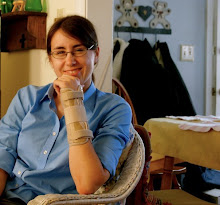Today we read the poem "Do Not Go Gentle Into That Good Night" by Dylan Thomas. It seemed an appropriate one, as we are also reading "Night" by Elie Wiesel. We read it after a discussion about Eliezer's questions of faith, and then we had to freewrite afterward. We could write about the poem or the book, whichever we chose. I decided to write about different parts of the poem that struck me, and see where I could go from there. Below is what I wrote. It may seem kind of random, but it makes sense to me!
1. "Do not go gentle into that good night": don't go into death completely willingly- fight death with every breath that remains in you.
Is this really a good thing? Isn't there a time when one is completely ready to die? Isn't there always a time when it is just for the best to give up? Maybe someone is too old to be able to live. Maybe the alternative to death is life as a cripple. Should you really be fighting death all the time? Certainly there are times to do that, but maybe there are times to give up and times to fight. It's like they say- pick your battles.
2. "Wise men know the dark": those who are wise can see death coming.
But should they fight, if they can see death coming? Do they? Is it wise to fight what you know is going to happen anyway?
3."frail deeds": Is this referring to good deeds? Are good deeds as frail as the poem seems to claim? Or are they stronger than that?
Good deeds are something we are commanded to do- but should we accept commands meekly? Or should we rebel as Elie did? He thought, Job thought, they both found that rebellion is an essential part of faith.
S0- God is an authority figure, the ultimate authority figure. And teenagers stereotypically rebel against authority figures. So if rebellion is an essential part of faith, are we going to be "teenagers" for our entire spiritual life? Will we ever really mature? Pastors and other religious leaders talk frequently about being a "mature Christian", which you seem to have to be a rebel in order to become a mature Christian. Therefore, there must be a stage when we have rebelled enough to have some questions answered, enough to assure us that this is what we want to be. Then we stop rebelling and we are mature spiritual adults.
In regard to good deeds, then, there must be a point when doing good deeds becomes a reasonable command again. Of course, it stands to reason that good deeds come full circle- they come right back to you- often tenfold. When this happens, the whole world will be in much better shape, because everyone will be doing good to each other, and good will be done to them too. If this is so, then good deeds are not at all frail- rather, they hold extraordinary power. It's only a matter of the power being unlocked.
I reasoned myself in a circle on that last one. The beauty of it is that it was completely unintentional. That's what is so great about freewriting. You never know what is going to come out.
Tuesday, January 04, 2005
Subscribe to:
Post Comments (Atom)

No comments:
Post a Comment